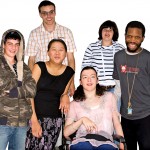
In his latest Researcher in Residence blog, Shuranjeet Singh reflects on the possibilities and pitfalls of balancing academic work with advocacy and action, a balance many of us are actively tussling with.
[read the full story...]
In his latest Researcher in Residence blog, Shuranjeet Singh reflects on the possibilities and pitfalls of balancing academic work with advocacy and action, a balance many of us are actively tussling with.
[read the full story...]
Emma Yapp summarises two new studies out yesterday looking at the PATH intervention (Psychological Advocacy Towards Healing), a CBT-informed psychological intervention delivered by trained domestic violence and abuse (DVA) advocates in specialist services.
[read the full story...]
Jill Manthorpe reports on a qualitative study that explores advocates views and experiences of their role in social care.
[read the full story...]
Around 7% of people with learning disabilities are parents, but they face significantly increased risks of being involved in care proceedings being more likely than other parents to lose the care of their children.
Here, in her Debut blog, Katherine Runswick-Cole looks at a study of the potential economic case for the provision of advocacy interventions to support parents with learning disabilities.
[read the full story...]
People with learning disabilities need to be able to talk about sexuality, sex and relationships, but often this opportunity is denied or is heavily influenced by existing social and cultural norms.
In this, her debut blog, Michelle Gregory looks at a paper which reports on how one self advocacy group tackled this issue and how they disseminated their findings.
[read the full story...]
Earlier this year, a national event organised by and for people with learning disabilities looked at the closure of long stay institutions. Here we reflect on the proceedings and the positive and constructive proposals that emerged.
[read the full story...]
Laurence Palfreyman highlights an RCT of the DECIDE intervention, which aims to build awareness of the service user’s role in decisions about their care including how they can become more involved and seek information from independent sources.
[read the full story...]
Autonomy is defined as the freedom to determine one’s own actions or behaviour. It is a value at the heart of health and social care support and those supporting people with learning disabilities are constantly striving to maintain and indeed increase the autonomy of those they provide help to. The authors of this Netherlands based [read the full story…]

Background A recent report from the Improving Health and Lives team suggested that over half of the advocacy organisations in the UK provide services for people with learning disabilities. The report pointed out that given the increasing move towards personalisation and the changes taking place in the organization of commissioning, that there was likely to [read the full story…]

Recent reports on the response of the NHS in England to the health needs of people with learning disabilites have uncovered poor practice and a lack of knowledge and skills (see for example Mencap Getting it Right campaign) We posted earlier in the week about the impact of liaison nursing, one response of the health [read the full story…]